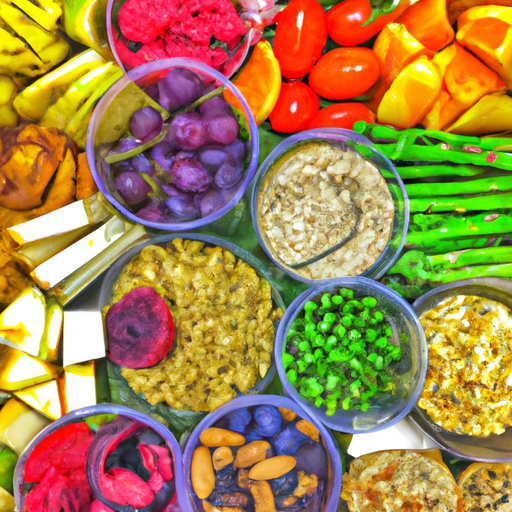
How Can I Handle Dietary Restrictions While Traveling?
Traveling can be an exciting and adventurous experience, but it can also pose challenges, especially if you have dietary restrictions. Whether you’re gluten-free, lactose intolerant, or have specific food allergies, navigating unfamiliar cuisines and unfamiliar restaurants can feel overwhelming. But fear not! In this article, we will explore practical tips and strategies to help you handle dietary restrictions while traveling, ensuring that you can enjoy your journeys to the fullest without sacrificing your health and well-being.
Plan ahead
Research the destination’s food options
When it comes to handling dietary restrictions while traveling, proper planning is key. One of the first steps you should take is to research the food options available at your destination. Look for restaurants, cafes, and supermarkets that offer a wide range of choices for individuals with dietary restrictions. This will help you ensure that you have access to suitable food throughout your trip.
Learn about local customs and cuisine
In addition to researching specific food options, it’s also important to learn about the local customs and cuisine of your destination. Understanding the typical ingredients used, cooking methods, and cultural norms can give you insights into what to expect and how to navigate your dietary restrictions in a respectful manner.
Contact your accommodation for meal options
Another useful tip is to contact your accommodation in advance to inquire about their meal options. Some hotels or rentals may be able to cater to your dietary needs or provide kitchen facilities where you can prepare your own meals. By reaching out to them beforehand, you can ensure that you have suitable meal arrangements for your stay.
Pack your own snacks
Choose snacks that comply with your dietary restrictions
To avoid any potential issues with finding suitable snacks during your trip, it’s a good idea to pack your own. Choose snacks that comply with your dietary restrictions, whether that means gluten-free, vegan, or any other specific requirements. This way, you’ll always have something to munch on when you’re on the go.
Pack enough snacks for the duration of your trip
When packing snacks, make sure you have enough to last for the duration of your trip. It’s better to be over-prepared than under-prepared when it comes to managing your dietary restrictions. Consider portion sizes and how often you’ll need to eat throughout the day, and pack accordingly. This will help prevent any hunger-induced challenges during your journey.
Communicate your dietary restrictions
Notify the airline about your dietary needs
If you’re traveling by air, it’s important to notify the airline about your dietary needs in advance. Most airlines offer special meals for passengers with dietary restrictions, such as gluten-free, vegetarian, or kosher options. By informing them ahead of time, you’ll have a better chance of receiving a meal that suits your needs during your flight.
Inform your travel companions and tour guides
When traveling with others or joining guided tours, it’s crucial to inform your travel companions and tour guides about your dietary restrictions. This way, they can help accommodate your needs when planning meals or choosing restaurants. Clear communication is key to ensuring a smooth and enjoyable trip for everyone involved.
Learn key phrases in the local language
In order to effectively communicate your dietary restrictions to locals at your destination, it can be helpful to learn some key phrases in the local language. Familiarize yourself with words or phrases that relate to your dietary needs, such as “gluten-free,” “dairy-free,” or “vegetarian.” This will enable you to effectively convey your requirements when dining out or shopping for food.
Choose accommodation with kitchen facilities
Look for hotels or rentals with a kitchenette
One way to overcome dietary restrictions while traveling is by choosing accommodation that offers kitchen facilities. Look for hotels or rentals with a kitchenette, which typically includes essential appliances like a refrigerator, stove, and microwave. Having access to these facilities allows you to prepare your own meals using ingredients that meet your dietary needs.
Ensure necessary cooking utensils and appliances are provided
When choosing accommodation with kitchen facilities, don’t forget to ensure that the necessary cooking utensils and appliances are provided. Check if items like pots, pans, knives, cutting boards, and mixing bowls are available. This will make it easier for you to cook and prepare meals according to your dietary restrictions.
Research local restaurants
Read reviews from other travelers with dietary restrictions
To find restaurants that cater to individuals with dietary restrictions, it can be helpful to read reviews from other travelers who share similar dietary needs. Look for online platforms or review websites where people share their experiences and recommendations. Reading about others’ experiences can give you valuable insights and save you time and effort in finding suitable dining options.
Visit online forums for recommendations
In addition to reading reviews, online forums can be a great resource for finding recommendations on restaurants that accommodate dietary restrictions. Engage with the travel community and ask for their advice or suggestions. Fellow travelers may have valuable firsthand experiences or insider tips for finding the best restaurants for your specific dietary needs.
Call or email restaurants in advance to inquire about menu options
For added peace of mind, consider calling or emailing restaurants in advance to inquire about their menu options. Explain your dietary restrictions and ask if they can accommodate your needs. This way, you can evaluate their understanding and willingness to provide suitable meals before deciding where to dine.
Visit grocery stores and markets
Purchase fresh produce and ingredients that meet your dietary needs
One of the best ways to ensure you have access to suitable food during your travels is to visit local grocery stores and markets. These establishments often offer a wide variety of fresh produce, allowing you to choose ingredients that align with your dietary restrictions. From fruits and vegetables to grains and proteins, shopping for these items can give you the freedom to prepare your own meals.
Explore local specialty shops for specific dietary-friendly products
Depending on your dietary restrictions, there may be specific specialty shops or health food stores that cater to your needs. Take the time to explore these establishments to find products that are tailored to your requirements. Whether it’s gluten-free bread, vegan alternatives, or lactose-free options, these shops can be a treasure trove for finding suitable food products.
Educate yourself about food labeling
Familiarize yourself with common allergen labels and symbols
When traveling to a new destination, it’s important to familiarize yourself with common allergen labels and symbols used on food packaging. This knowledge can help you avoid consuming any ingredients that may pose a risk to your health. Take the time to research and understand these labels, ensuring that you can make informed choices when shopping or dining out.
Learn about local food labeling regulations
In addition to understanding common allergen labels and symbols, it’s also worth learning about the local food labeling regulations at your destination. Some countries have specific guidelines or requirements for labeling certain food products. By being aware of these regulations, you’ll be better equipped to navigate the local food market and identify suitable options.
Seek medical advice
Consult your healthcare provider or a nutritionist before your trip
Seeking medical advice before your trip is especially important for individuals with severe dietary restrictions or medical conditions. Schedule an appointment with your healthcare provider or a nutritionist to discuss your dietary needs and any potential concerns. They can offer valuable guidance and advice on how to manage your diet while traveling.
Ask about potential dietary concerns or precautions for your destination
During your consultation, be sure to ask your healthcare provider or nutritionist about any potential dietary concerns or precautions for your specific destination. They may have insights into local cuisine, potential allergens, or other factors that could impact your dietary restrictions. By being proactive and seeking this information, you can better protect your health and well-being.
Consider dietary supplements
Pack necessary vitamins or supplements to supplement your travel diet
In some cases, it may be necessary to pack certain vitamins or supplements to supplement your travel diet. If your dietary restrictions limit your intake of certain nutrients, consult with your healthcare provider or nutritionist to determine which supplements may be beneficial. Packing these supplements can help ensure that you maintain optimal nutrition throughout your trip.
Research local availability and regulations for importing supplements
Before relying solely on your own supply of dietary supplements, it’s important to research the local availability and regulations at your destination. Some countries may have restrictions or regulations on certain supplements, so familiarize yourself with these policies to avoid any issues at customs. If necessary, investigate local sources or alternative options for obtaining the supplements you need.
Be cautious with street food
Inspect food stalls for cleanliness and hygiene
Street food can offer an exciting and authentic culinary experience, but it’s important to exercise caution, especially when you have dietary restrictions. Take the time to inspect food stalls for cleanliness and hygiene. Look for vendors who adhere to proper food handling practices and maintain a clean cooking environment. This will reduce the risk of cross-contamination or consuming unsafe food.
Ask about ingredients or potential allergens
When purchasing street food, don’t hesitate to ask the vendor about the ingredients or potential allergens in their dishes. Communicate your dietary restrictions clearly and ask for their assistance in choosing a suitable option. Most vendors will be happy to help you find a dish that meets your needs.
Consider hot, freshly cooked options
To minimize the risk of foodborne illnesses or contamination, consider opting for hot, freshly cooked street food. Heat can help kill bacteria or parasites that may be present in raw or undercooked food. Choose options that are cooked to order or prepared in front of you to ensure that you’re consuming safe and suitable meals.
Handling dietary restrictions while traveling may require extra effort and planning, but it’s definitely achievable. By researching your destination’s food options, packing your own snacks, communicating your dietary needs, choosing accommodation with kitchen facilities, researching local restaurants, visiting grocery stores and markets, educating yourself about food labeling, seeking medical advice, considering dietary supplements, and being cautious with street food, you can enjoy your journey while staying true to your dietary needs. Remember, planning ahead and clear communication are your best allies in managing your dietary restrictions while traveling. Bon appétit and safe travels!




